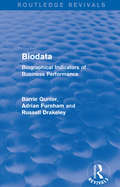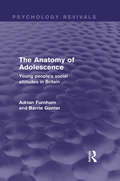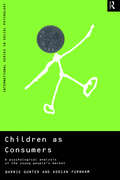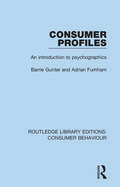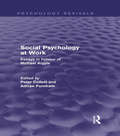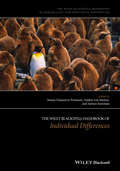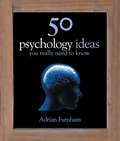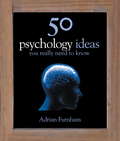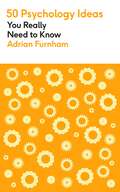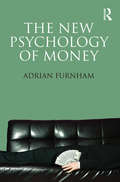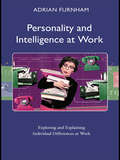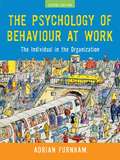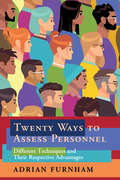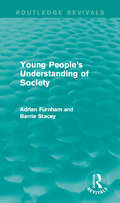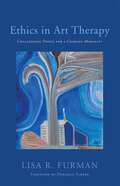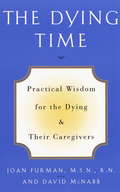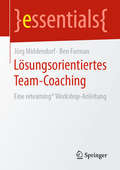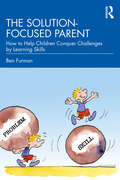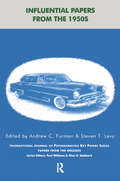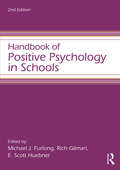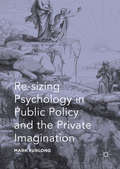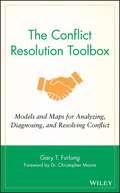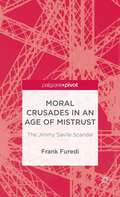- Table View
- List View
Biodata (Routledge Revivals): Biographical Indicators of Business Performance
by Adrian Furnham Barrie Gunter Russell DrakeleyFirst published in 1993. This book is intended for managers and occupational psychologists involved in the selection and assessment of the workforce. It details the history and development of the use of biographical data for both recruitment and promotion of employees. Grounded in relevant research literature, it offers a comprehensive analysis of the advantages and disadvantages of biodata in different contexts. It also includes examples of applications and recommendations for use, as well as examples of questionnaires. Written by experts, it represents a wide-ranging review of the contemporary research in the field. This work will be of interest to students of business and psychology.
The Anatomy of Adolescence: Young people's social attitudes in Britain (Psychology Revivals)
by Adrian Furnham Barrie GunterOriginally published in 1989, this is a unique reference source to the social attitudes of British adolescents of the time. The authors, both experienced researchers, draw on a sample of over 2,000 adolescents from all over the British Isles, including Northern Ireland and the north of Scotland as well as the south of England and Wales. They provide one of the most comprehensive reviews of the 1980s, with the results summarized in tables supported by clear commentaries. The contents range widely over key issues of the time, covering attitudes to politics and government, crime and law enforcement, sex roles and race, religion and the paranormal, health and the environment, school, work and unemployment, and home entertainment media. Some of the book’s findings are unexpected: young people are surprisingly conservative about the role of men and women, for instance, yet they have radical ideas about certain institutions, like the monarchy. Altogether the book gives a clear and revealing snapshot of the attitudes of young Britons of the time.
Children as Consumers: A Psychological Analysis of the Young People's Market (International Series in Social Psychology)
by Adrian Furnham Barrie GunterThe children's and teenagers' market has become increasingly significant as young people have become more affluent and have an ever growing disposable income. Children as Consumers traces the stages of consumer development through which children pass and examines the key sources of influence upon young people's consumer socialisation. It examines: * the kinds of things young people consume * how they use their money * how they respond to different types of advertising * whether they need to be protected through special legislation and regulation * market research techniques that work well with young people. Children as Consumers will be useful to students of psychology, sociology, business and media studies, as well as professionals in advertising and marketing.
Consumer Profiles: An introduction to psychographics (Routledge Library Editions: Consumer Behaviour)
by Adrian Furnham Barrie GunterPsychographics have been developed in the field of market research as a way to relate consumer behaviour to market choice. This book, originally published in 1992, introduces the essential elements of psychographics. It shows how researchers go about defining consumer profiles and designing successful research programmes. It looks at the way they are applied in various consumer groups and uses case study material to focus on some specific products from cameras to pet food.
Social Psychology at Work: Essays in honour of Michael Argyle (Psychology Revivals)
by Adrian Furnham Peter CollettSocial psychology has much to offer real world problems, especially in industrial and organizational settings. Originally published in 1995, in Social Psychology at Work leading researchers in their respective fields discuss recent findings and their implications for the commercial world of work. All the contributors have been greatly influenced by the late Michael Argyle, to whom this book is dedicated. They examine aspects of the workplace from the perspectives of personality and individual difference, social psychology and organizational psychology. Subjects covered include the effects of age on work, leadership, productivity, how we are socialized for work, stress and anxiety, and the effect of the physical environment on working behaviour. Social Psychology at Work is a rich source book of ideas, research findings and reviews at the interface of pure and applied psychology. It will be important and rewarding reading for all those such as students, consultants and managers and trainers who are interested in psychology at work.
The Wiley-Blackwell Handbook of Individual Differences
by Adrian Furnham Tomas Chamorro-Premuzic Sophie Von StummThe Wiley-Blackwell Handbook of Individual Differences provides a comprehensive, up-to-date overview of recent research, current perspectives, practical applications, and likely future developments in individual differences. Brings together the work of the top global researchers within the area of individual differences, including Philip L. Ackerman, Ian J. Deary, Ed Diener, Robert Hogan, Deniz S. Ones and Dean Keith SimontonCovers methodological, theoretical and paradigm changes in the area of individual differencesIndividual chapters cover core areas of individual differences including personality and intelligence, biological causes of individual differences, and creativity and emotional intelligence
50 Psychology Ideas You Really Need to Know
by Adrian FurnhamHow different are men and women's brains? Does altruism really exist? Are our minds blank slates at birth? And do dreams reveal our unconscious desires?If you have you ever grappled with these concepts, or tried your hand as an amateur psychologist, 50 Psychology Ideas You Really Need to Know could be just the book for you. Not only providing the answers to these questions and many more, this series of engaging and accessible essays explores each of the central concepts, as well as the arguments of key thinkers. Author Adrian Furnham offers expert and concise introductions to emotional behavior, cognition, mentalconditions--from stress to schizophrenia--rationality and personality development, amongst many others.This is a fascinating introduction to psychology for anyone interested in understanding the human mind.
50 Psychology Ideas You Really Need to Know
by Adrian FurnhamHow different are men and women's brains? Does altruism really exist? Are our minds blank slates at birth? And do dreams reveal our unconscious desires? Psychology is everywhere in today's society. No crime fiction, documentary, chat show or medical consultation is complete without the introduction of a psychological angle. Psychology seeks to understand and explain thoughts, feelings and behaviour through a dizzying array of ideas and theories, shedding light on everything from memory, social mobility and attitude formation to delusions of grandeur, alcoholism and computer phobia, to name a few. In 50 Psychology Ideas You Really Need to Know, Professor Adrian Furnham explains the central ideas of psychology in 50 concise and accessible essays. Packed with the latest research, most important case studies and arguments of key thinkers, this book is the perfect introduction to psychological theory. Contents include: Placebo effect; Kicking the habit; Hallucinations; Positive psychology; Emotional intelligence; IQ and you; Multiple intelligences; The Rorschach inkblot test; Detecting lies; Obedience to authority; Self-sacrifice or selfishness; Gambler's fallacy; Remembrance of things past; Artificial intelligence; Tip-of-the-tongue phenomenon; Psychosexual stages; Tabula rasa; Phrenology; Dyslexia.
50 Psychology Ideas You Really Need to Know (50 Ideas You Really Need to Know series)
by Adrian FurnhamHow different are men and women's brains? Does altruism really exist? Are our minds blank slates at birth? And do dreams reveal our unconscious desires? Psychology is everywhere in today's society. No crime fiction, documentary, chat show or medical consultation is complete without the introduction of a psychological angle. Psychology seeks to understand and explain thoughts, feelings and behaviour through a dizzying array of ideas and theories, shedding light on everything from memory, social mobility and attitude formation to delusions of grandeur, alcoholism and computer phobia, to name a few. In 50 Psychology Ideas You Really Need to Know, Professor Adrian Furnham explains the central ideas of psychology in 50 concise and accessible essays. Packed with the latest research, most important case studies and arguments of key thinkers, this book is the perfect introduction to psychological theory. Contents include: Placebo effect; Kicking the habit; Hallucinations; Positive psychology; Emotional intelligence; IQ and you; Multiple intelligences; The Rorschach inkblot test; Detecting lies; Obedience to authority; Self-sacrifice or selfishness; Gambler's fallacy; Remembrance of things past; Artificial intelligence; Tip-of-the-tongue phenomenon; Psychosexual stages; Tabula rasa; Phrenology; Dyslexia.
50 Psychology Ideas You Really Need to Know (50 Ideas You Really Need to Know series)
by Adrian FurnhamIn a series of 50 accessible essays, Adrian Furnham introduces and explains key theories around clinical and developmental psychology, behaviourism, society and personality, cognitive psychology and individual differences.From understanding emotions to detecting perception, Freud's psychosexual stages to the placebo effect, 50 Psychology Ideas You Really Need to Know is a complete introduction to the most important psychological concepts in history.
The New Psychology of Money
by Adrian FurnhamThe New Psychology of Money is an accessible and engrossing analysis of our psychological relationship to money in all its forms. Comprehensive and insightful, Adrian Furnham explores the role that money plays in a range of contexts, from the family to the high street, and asks whether the relationship is always a healthy one. Discussing how money influences what we think, what we say, and how we behave in a range of situations, the book places the dynamics of high finance and credit card culture in context with traditional attitudes towards wealth across a range of cultures, as well as how the concept of money has developed historically. The book is split into four sections: Understanding Money. What are our attitudes to money, and how does nationality, history and religion mediate those attitudes? Money in the Home How do we grow up with money, and what role does it play within the family? What role does gender play, and can we lose control in dealing with money? Money at Work. Are we really motivated by money at work? And what methods do retailers use to persuade us to part with our money? Money in Everyday Life. How do we balance the need to create more money for ourselves through investments with the desire to make charitable contributions, or give money to friends and family? How has the e-revolution changed our relationship to money? Radically updated from its original publication in 1998, The New Psychology of Money is a timely and fascinating book on the psychological impact of an aspect of daily life we generally take for granted. It will be of interest to all students of psychology, economics and business and management, but also anyone who takes an interest in the world around them.
Personality and Intelligence at Work: Exploring and Explaining Individual Differences at Work
by Adrian FurnhamPersonality and Intelligence at Work examines the increasingly controversial role of individual differences in predicting and determining behaviour at work. It combines approaches from organizational psychology and personality theory to critically examine the physical, psychological and psychoanalytic aspects of individual differences, and how they impact on the world of work. Topics covered include the role of IQ at work as the best predictor of success, but also the importance of increasingly recognized social intelligences such as emotional intelligence (EQ). The significance of personality traits and the impact of temperaments on work performance are also examined, and the methods used to assess work behaviour and potential are reviewed. Psychological tests, which measure personality traits, are questioned as accurate predictors of behaviour at work, alongside other factors such as job satisfaction, productivity, absenteeism and turnover. This thoroughly revised and updated edition of Personality at Work provides a comprehensive review of the relevant literature from psychology, sociology and management science. It will be of interest to students of organizational psychology and business and management studies, as well as HR professionals.
The Psychology of Behaviour at Work: The Individual in the Organization
by Adrian FurnhamThis superb introduction to the field of organizational psychology and organizational behaviour builds on the foundation of the highly successful first edition to provide up-to-date explanations of all the key topics in a clear, coherent and accessible style. The text is supported by numerous illustrations and examples as well as end-of-chapter summaries and concluding remarks. Topic sections on key research studies, as well as applied aspects such as human resources applications and cross-cultural issues, lead the reader through the complexities of the theory to its practical application.The Psychology of Behaviour at Work covers all major topics in the field, from vocational choice, personality, attitudes, motivation and stress, to cooperation, learning, training, group dynamics, decision making and leadership. Further sections introduce corporate culture and climate, as well as organisational structure, change and development, and a final section outlines predictions not only for the future study of organizational psychology, but of the future of work itself. As with the first edition, The Psychology of Behaviour at Work will prove to be an invaluable resource for psychology students on work and organizational psychology courses, business students on organizational behaviour courses, and human resources managers eager to expand their knowledge of this fascinating field.
Twenty Ways to Assess Personnel: Different Techniques and their Respective Advantages
by Adrian FurnhamOver the years, there has been more and more research to test the validity of personnel assessment methods, an area which is far from easy. This book compares traditional practices against new techniques, including social media analytics, wearables, mobile phone logs, and gamification. Researchers and businesses alike know the importance of making good, and avoiding bad, selection decisions, but are unsure of how to proceed effectively. This book maps out the viable options and advises on best practice. The author combines both practical applications and academic, psychological research to explain how each method works, the theory behind it, and the extent of the evidence that supports it.
Young People's Understanding of Society (Adolescence And Society Ser.)
by Adrian FurnhamFirst published in 1991, this book represents the first wide-ranging review of young people’s understanding of the social world and the functioning of society. Taking a social cognitive view of adolescence, it focuses on the processes by which young people learn to understand other people’s thoughts, emotions, intentions and behaviour. Concentrating on the social world of politics, economics, work, gender and religion, the authors cover such issues as: politics and government; work and unemployment; law and legislative matters; religion; marriage and the family; social class; and racial and ethnic differences. This work will be of interest to students of sociology and psychology.
Ethics in Art Therapy: Challenging Topics for a Complex Modality
by Lisa R. Furman Deborah FarberDue to the complicated nature of using art and art materials in clinical practice, art therapists are often confronted with ethical considerations that are unique to their field. This book explores challenging topics in the ethical practice of art therapy. Professional guidelines do not always address the gray areas of important ethical issues in art therapy practice. Art therapists must therefore have a strong sense of personal standards by which to navigate morally ambiguous situations. Using case examples and current ethical theory, the book provides much-needed guidance for how to handle dilemmas such as receiving client art as gifts, displaying client art, religious and sexual issues, and the documentation and digital dissemination of confidential material and artwork. This book will be a valuable resource for art therapy students, graduate supervisors, new practitioners, and more experienced clinicians looking to increase their awareness of complex ethical issues.
The Dying Time
by Joan Furman David Mcnabb"One of the best books available on caring for the dying, The Dying Time combines deep insight and down-to-earth practicality. All caregivers need to know what's between these covers. This book demystifies the process of death, yet honors the sacredness of life's final transition. Highly recommended." Larry Dossey, M.D., author of Prayer Is Good Medicine"Living until we die can be difficult. This book can guide you through that time. It is practical, spiritual, and filled with wisdom."Bernie S. Siegel, M.D., author of Love, Medicine, and MiraclesHere is a comprehensive and thorough handbook for the dying and their caregivers. Joan Furman and David McNabb walk the reader through the dying time, providing details on how to make the environment conducive to peace and tranquillity, give physical care, understand and respond to the emotional and spiritual crises that naturally occur, and stay healthy as a caregiver. They answer with honesty and sensitivity the questions most frequently asked, such as what actually happens at the time of death. The book also deals with arranging for a meaningful memorial service and handling grief for those who are left behind. And it offers guided imagery for coping with pain and suggests literature and music to ease the passage of those whose health is irreversibly failing.From the Trade Paperback edition.
Lösungsorientiertes Team-Coaching: Eine reteaming® Workshop-Anleitung (essentials)
by Ben Furman Jörg MiddendorfIn diesem essential werden die Grundlagen des lösungsfokussierten Team-Coachings sowie ein konkreter Workshop-Ablauf dargestellt. Das zugrundeliegende reteaming®-Konzept von Ben Furman und Tapani Ahola ist seit Jahren und rund um den Globus praxiserprobt. Der gesamte Beratungsprozess wird Schritt für Schritt dargestellt, sodass Berater und Coaches konkretes Werkzeug zur Durchführung ihrer Team-Coachings erhalten. Zusätzlich werden für jeden Schritt Beispiele für die Visualisierung der notwendigen Flipcharts zur Verfügung gestellt. Die Autoren sprechen damit in erster Linie Coaches und Berater an, die ihre Tätigkeit durch das lösungsorientierte Arbeiten mit Teams bereichern möchten. Gleichzeitig lassen sich die grundlegenden Prinzipien auch gut auf das Führen von Teams übertragen.
Kids' Skills: Playful and Practical Solution-finding with Children
by Ben FurmanWorking with children to convert problems into skills. Well-known Finnish psychotherapist and TV presenter, Ben Furman, shares the Kids' Skills model for working with children that is influencing parents, teachers, counsellors and policy makers around the world. This is a playful and practical approach to solving difficulties faced by children where practically all problems can be seen as skills that need to be developed. This method invites children to become active participants in skill-building and solution-finding. A book buzzing with ideas, stories and suggestions. - Converting problems into skills. - Agreeing on the skill to learn - Naming the skill and choosing a power creature - Gathering supporters and building confidence - Planning the celebration and going public - Practising the skill and creating reminders
The Solution-focused Parent: How to Help Children Conquer Challenges by Learning Skills
by Ben FurmanThis practical book presents readers with a skills-based, child rearing approach to supporting a child’s growth and helping them overcome both minor and major developmental challenges. In contrast to conventional approaches to child psychology, this innovative approach focuses on developing children’s abilities rather than concentrating on and trying to fix their “problems.” Additionally, instead of blaming caretakers for their child’s challenges, the skills approach offers them the keys with which they can coach and motivate their children to overcome challenges by learning required skills. Readers will find it easy to grasp the idea of the skills mindset through the book’s wealth of eye-opening stories, case examples, and the author’s personal insights as a psychotherapist, parent, and creator of the Kids’Skills method. Clear, detailed instructions will help readers immediately put the ideas into everyday practice with their own children and families. This book is a must-have, hope-instilling toolbox for anyone involved in the task of raising a child. Parents, grandparents, teachers, mental health professionals, and more will find this a valuable resource in ensuring the future success of the children in their lives.
Influential Papers from the 1950s (The IJPA Key Papers Series)
by Andrew C. Furman Steven T. LevyThis volume presents a series of papers that appeared in the International Journal of Psycho-Analysis during the 1950s. It recognizes a turning of psychoanalytic attention from the exploration of the analysand's intra-psychic experience to mapping out equally relevant psychoanalytic concerns.
Handbook of Positive Psychology in Schools: Supporting Process And Practice (Educational Psychology Handbook)
by Michael J. Furlong Rich Gilman E. Scott HuebnerUnderstanding the factors that encourage young people to become active agents in their own learning is critical. Positive psychology is one lens that can be used to investigate the factors that facilitate a student’s sense of agency and active school engagement. In the second edition of this groundbreaking handbook, the editors draw together the latest work on the field, identifying major issues and providing a wealth of descriptive knowledge from renowned contributors. Major topics include: the ways that positive emotions, traits, and institutions promote school achievement and healthy social and emotional development; how specific positive-psychological constructs relate to students and schools and support the delivery of school-based services; and the application of positive psychology to educational policy making. With thirteen new chapters, this edition provides a long-needed centerpiece around which the field can continue to grow, incorporating a new focus on international applications of the field.
Re-sizing Psychology in Public Policy and the Private Imagination
by Mark FurlongThis book interrogates the current reputation of Psychology, both as an industry and as part of the academy. It disputes Psychology's claim to be a science, questions its claims to effectiveness and examines relationships with other disciplines and fields. Just as Psychology's role in the design of addictive gaming machines has been underplayed so too has the conservative aspect of its regulation of normality and pathology. The discipline of Psychology affects our understanding of identity and subjectivity to position the self as amoral and disconnected. This book questions this assumption and, more generally, the received status of Psychology.
The Conflict Resolution Toolbox: Models And Maps For Analyzing, Diagnosing, And Resolving Conflict
by Gary FurlongIn real-life conflict resolution situations, one size does not fit all. Just as a mechanic does not fix every car with the same tool, the conflict resolution practitioner cannot hope to resolve every dispute using the same technique. Practitioners need to be comfortable with a wide variety of tools to diagnose different problems, in vastly different circumstances, with different people, and resolve these conflicts effectively. The Conflict Resolution Toolbox gives you all the tools you need: eight different models for dealing with the many conflict situations you encounter in your practice. This book bridges the gap between theory and practice and goes beyond just one single model to present a complete toolbox - a range of models that can be used to analyze, diagnose, and resolve conflict in any situation. It shows mediators, negotiators, managers, and anyone needing to resolve conflict how to simply and effectively understand and assess the situations of conflict they face. And it goes a step further, offering specific, practical guidance on how to intervene to resolve the conflict successfully. Each model provides a different and potentially useful angle on the problem, and includes worksheets and a step-by-step process to guide the reader in applying the tools. Offers eight models to help you understand the root causes of any conflict. Explains each model's focus, what kind of situations it can be useful in and, most importantly, what interventions are likely to help. Provides you with clear direction on what specific actions to choose to resolve a particular type of conflict effectively. Features a detailed case study throughout the book, to which each model is applied. Additional examples and case studies unique to each chapter give the reader a further chance to see the models in action. Includes practical tools and worksheets that you can use in working with these models in your practice. The Conflict Resolution Toolbox equips any practitioner to resolve a wide range of conflicts. Mediators, negotiators, lawyers, managers and supervisors, insurance adjusters, social workers, human resource and labour relations specialists, and others will have all the tools they need for successful conflict resolution.
Moral Crusades in an Age of Mistrust: The Jimmy Savile Scandal
by Frank FurediThe epidemic of scandals unleashed by the Savile Scandal highlights the precarious status of relations of trust. The rapid escalation of this crisis offers insights into the relationship between anxieties about childhood and the wider moral order. This book explains why western society has become so uncomfortable with the exercise of authority.
